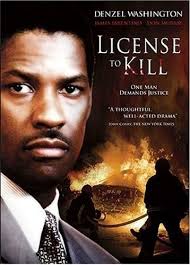
LICENSE TO KILL__
US, 1984, 96 minutes, Colour.
James Farantino, Penny Fuller, Don Murray, Millie Perkins, Denzel Washington, Ari Meyers, Donald Moffat, Jacqueline Brookes, Kristin Vigard.
Directed by Jud Taylor.
License to kill sounds like espionage and, in fact, within four years the James Bond film of this title was released. Audiences may think at the beginning of this film that it will be a revenge film, the father taking revenge for the drunk driving death of his daughter.
This is a television film of the 1980s and made an impact with its message about drink-driving and the consequences. Later commentators have found the message too obvious – but, the average television-watching audience will probably find it effectively hard-hitting.
The film shows the ideal American family, the young daughter getting a school prize and about to go off to college, killed in the drunk driver accident. Her parents are played by James Farentino and Penny Fuller, the father having the male reaction, wanting to be busy rather than at home supporting his wife and expressing his emotions. The wife, not supported by her husband, withdraws. (One hopes that with growing consciousness since the 1980s, there is much more effectiveness in husbands and wives supporting each other.)
There are delays in the court hearings. The driver is played by Don Murray, in denial about his drinking and concerned about his reputation. His supportive wife is played by Millie Perkins who is aware of his drinking.
In the court, Jacqueline Brookes is an effective judge, strong in her final summing up in sentencing. Donald Moffat is the shrewd lawyer for the defence. Denzel Washington in an early role is the prosecutor.
1. The title? Not an espionage story? Drunk driving and the license to kill on the roads?
2. A film of the 1980s, the television audience, television style in drawing characters, issues, message film? Its impact now?
3. The ordinary American city, the ordinary American family, college, socials? The atmosphere of the prize-giving? The family at home, family pride? The two sisters? The boyfriend, the social? The sleepover?
4. Lynn, her character, success, her parents, offering to drive her sister, watching the people of the town, the crash, her injuries, dying in hospital? The news for her parents, the phone call, going to the hospital?
5. Her father’s reaction, going out of the house, not dealing with the death emotionally, the male busy reaction? The contrast with her mother, going into herself, no support from her husband, her withdrawing into her room, to bed? The father telling the little daughter, the denial, upset, yet managing the house despite her mother, the meals?
6. Fiske, with his pals at the club, on his building sites, his drinking, jovial, nobody stopping him driving? Driving drinking, smoking, not paying attention, swerving with the boy on the bike the boy’s falling? Not giving way that the stop sign? The crash? His minimal injuries? Asking about the ambulance? Going to phone his wife? Asking her to pick him up? The police and their reaction, the witnesses, the smell of alcohol? His asserting himself? Being taken by the police? The blood alcohol test? His going home? His wife and her concern about his drinking? His later continuing, denial of the previous arrests, drunk and taking the boys to the match, his wife’s protest?
7. Jack and the discussion with the lawyer, the grief of the funeral, Jack leaving, returning late, abandoning Judy? The discussion about civil and criminal cases? His not wanting money? His growing obsession with justice? The appointment from the district attorney, the busyness of the office, the offhand manner of the receptionist, phone calls not returned?
8. The increasing tension at home, his insensitivity to Judy, her eventually giving up, the possibilities for talking, possibilities for reconciliation? The daughter, her being upset, not wanting the sleepover? Her father busy, studying the books? His not performing well at work and the loss of custom?
9. Going to court, the encounter with Martin Sawyer? His being overburdened with cases? Not personal enough with Jack? The continuance for one month, then the later continuance, the judge, presence, attention to the case, her demanding that they be ready?
10. Fiske, the discussions with the lawyer, his reputation, getting the accused of from drink driving cases, his fee? Discussions? The tactics? Shrewdness? Availability of witnesses? His cross-examination? The boy and his falling from his bike? The neighbour and hearing five words and asked whether he was a linguist? Cross-examination of the policeman, the emergency, the blood sample on the desk for hours, grounds for not admitting the results?
11. The discussion with Fiske and his wife with the lawyer, the issue of whether he would testify on not? His wife’s point of view? The lawyer’s point of view? Fisk going on the stand, the evidence against him? Sawyer, the witness of the credit card, the bills at the restaurant and club, proving that he had more to drink?
12. Jack, Judy going with him to the case? The impact of the hearing? The judgement of the jury? Sawyer’s appeal for imprisonment? The judge and her speech against drivers? Jack leaving, weaving?
13. Judy, the encounter with Mrs Fiske, their wishing well to each other?
14. The relevance of this kind of story, always? The moralising – and the appeal to ordinary citizens, television movie watchers?